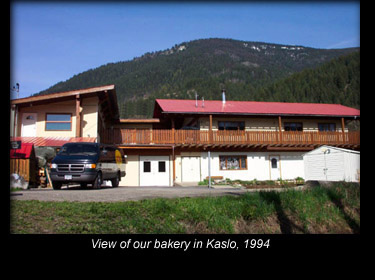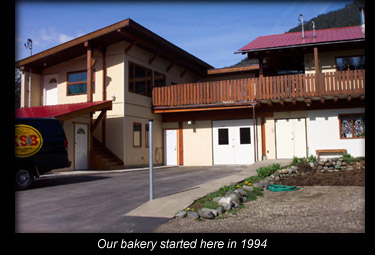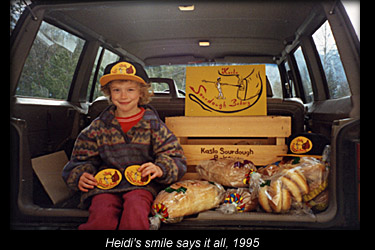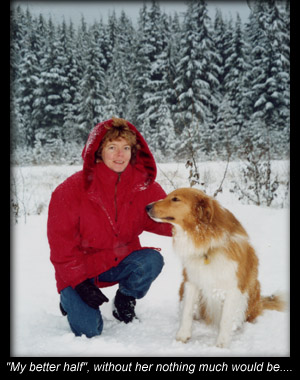
 The decision to bake full time, year around and therefore officially start Kaslo Sourdough Bakery was made after I had baked two years in an Outdoor Wood Fired Brick Oven in downtown Kaslo. The continuous necessity of baking in this oven on a daily basis to keep it at optimum temperature for baking was becoming a chore and challenge. In spring and fall the overnight temperatures had a big impact on heat retention, and it was impossible to bake during winter. Come each fall my loyal customers would dread having to do without good bread over the winter, so I received plenty of encouragement to continue baking and somehow manage to all year around. The decision to bake full time, year around and therefore officially start Kaslo Sourdough Bakery was made after I had baked two years in an Outdoor Wood Fired Brick Oven in downtown Kaslo. The continuous necessity of baking in this oven on a daily basis to keep it at optimum temperature for baking was becoming a chore and challenge. In spring and fall the overnight temperatures had a big impact on heat retention, and it was impossible to bake during winter. Come each fall my loyal customers would dread having to do without good bread over the winter, so I received plenty of encouragement to continue baking and somehow manage to all year around.
I had just completed building my wood working shop. I was torn between two business adventurous and at the end the bank loan did not finance wood working equipment but bakery equipment; food is more important then material things. My transformation from the passion for wood had gradually turned into the passion of making sourdough bread.

I had gained intimate knowledge over the two past years and my customers base assured me that I was onto something quite special. Being of a relentless and inquiry nature when it comes to perfection I was exploring new territory with the aura of myth that surrounds sourdough bread which has endured from its historic past.

My wife fully supported me in this decision but it did hurt a bit leaving behind my artistic side of wood carving. Once I had swallowed this pill, I was able to fully through myself into becoming a full time sourdough baker.

We also decided that it would be better for our young family at the time to wholesale our bread rather then open a retail bakery, where other products beside bread is expected, I wanted to concentrate on original sourdough bread that has been one of essential parts since mankind discovery agriculture and subsequent fermentation techniques.

 The next hurtle was to get the finances to complete construction, and buy the necessary equipment that was needed for a bakery. A business loan would be nice but there was no bank that would give us one, so we regretfully took out a mortgage on our house. Even with our house as collateral, the first bank turned us down, but eventually we got the money from another bank, getting things started. The winter was again spent with construction. The new bakery needed to have appropriate sanitary standards, which included proper plumbing, and extra electrical wiring to be installed. If we were going to do it, we were going to do it right. We were determined to get our new enterprise off the ground and be ready by the following April (1994). My wife would also be more involved in our future bakery. We have always worked together quite well, and I didn't anticipate any problems in the future working together with her. The next hurtle was to get the finances to complete construction, and buy the necessary equipment that was needed for a bakery. A business loan would be nice but there was no bank that would give us one, so we regretfully took out a mortgage on our house. Even with our house as collateral, the first bank turned us down, but eventually we got the money from another bank, getting things started. The winter was again spent with construction. The new bakery needed to have appropriate sanitary standards, which included proper plumbing, and extra electrical wiring to be installed. If we were going to do it, we were going to do it right. We were determined to get our new enterprise off the ground and be ready by the following April (1994). My wife would also be more involved in our future bakery. We have always worked together quite well, and I didn't anticipate any problems in the future working together with her.

 The equipment was another matter: especially the oven, which turned out to be quite a problem. A conventional bakery oven would not have been a problem, but they were not suitable to bake real sourdough bread. These modern ovens are tailored to bake the spongy type of bread that is customary for North America, nowadays making up 95 % or more of the bread market. Our oven needed to have stone decks that could bake our bread thoroughly through; only that primal heat could be obtained from an oven designed to bake sourdough bread like ours. Only in Europe, where they historically baked heavy rye breads do they also manufacture such ovens. With a lot of investigation and research we finally managed to find an older oven that had been built and imported from Germany in 1961, and had seen its share of baking in the Toronto area. I am glad to say that a newer one has since replaced that temperamental old oven, which has caused me some grief, and I still cringe when I think of it. The equipment was another matter: especially the oven, which turned out to be quite a problem. A conventional bakery oven would not have been a problem, but they were not suitable to bake real sourdough bread. These modern ovens are tailored to bake the spongy type of bread that is customary for North America, nowadays making up 95 % or more of the bread market. Our oven needed to have stone decks that could bake our bread thoroughly through; only that primal heat could be obtained from an oven designed to bake sourdough bread like ours. Only in Europe, where they historically baked heavy rye breads do they also manufacture such ovens. With a lot of investigation and research we finally managed to find an older oven that had been built and imported from Germany in 1961, and had seen its share of baking in the Toronto area. I am glad to say that a newer one has since replaced that temperamental old oven, which has caused me some grief, and I still cringe when I think of it.

 When April came around, we had just managed to get the last things in place and have some trial bakes. I was pleasantly surprised that within a short time I had things under control. New varieties of bread were easily added to our breadline. The importance of including seeded breads became apparent for us earlier on, and was developed accordingly. We have continued to invent and come up with new kinds of bread as the demand for them grew, a recent example being wheat free breads. This led to more and more rye based breads, and spelt breads. When April came around, we had just managed to get the last things in place and have some trial bakes. I was pleasantly surprised that within a short time I had things under control. New varieties of bread were easily added to our breadline. The importance of including seeded breads became apparent for us earlier on, and was developed accordingly. We have continued to invent and come up with new kinds of bread as the demand for them grew, a recent example being wheat free breads. This led to more and more rye based breads, and spelt breads.

We shipped our first breads to our new retail outlets that spring (1994). Our biggest asset is the originality of our breads, and the supportive nature of our costumers. The intimacy with our costumer base has regretfully diminished since selling wholesale. We strive to keep our breads faithfully original to our successful past. We also make a sourdough bun which we call a "Wagel ®". This is a novelty item, which proves, just as our breads do, that baking traditionally still has its merits.

The incessant studies that I have carried on from the very first day have provided me with the necessary insight into the baking technology from the past as well as from the present. The bread that swamps the modern market lacks the vital essence that is so necessary for our successful survival in the future. I believe this vital essence to be the bacterial culture (microorganisms), which can only be had in a truly traditional sourdough bread. I am sure that as you keep exploring our website, you will probably agree with many of my views on this subject. All I have done for the past 12 years is analyze factual historical events, and made the connecting implications that it has had over the past 150 years on our daily diet. It all started originally in a nostalgic sort of way, and has progressed into a much more earnest undertaking. The bitter seriousness of the state our food situation is in, does not allow me to keep my finds to myself alone anymore. With the power and ease of the information highway, I can reach out in an economic and environmentally friendly manner to all that are interested and share this pertinent information. Keep on spreading the message.

|
